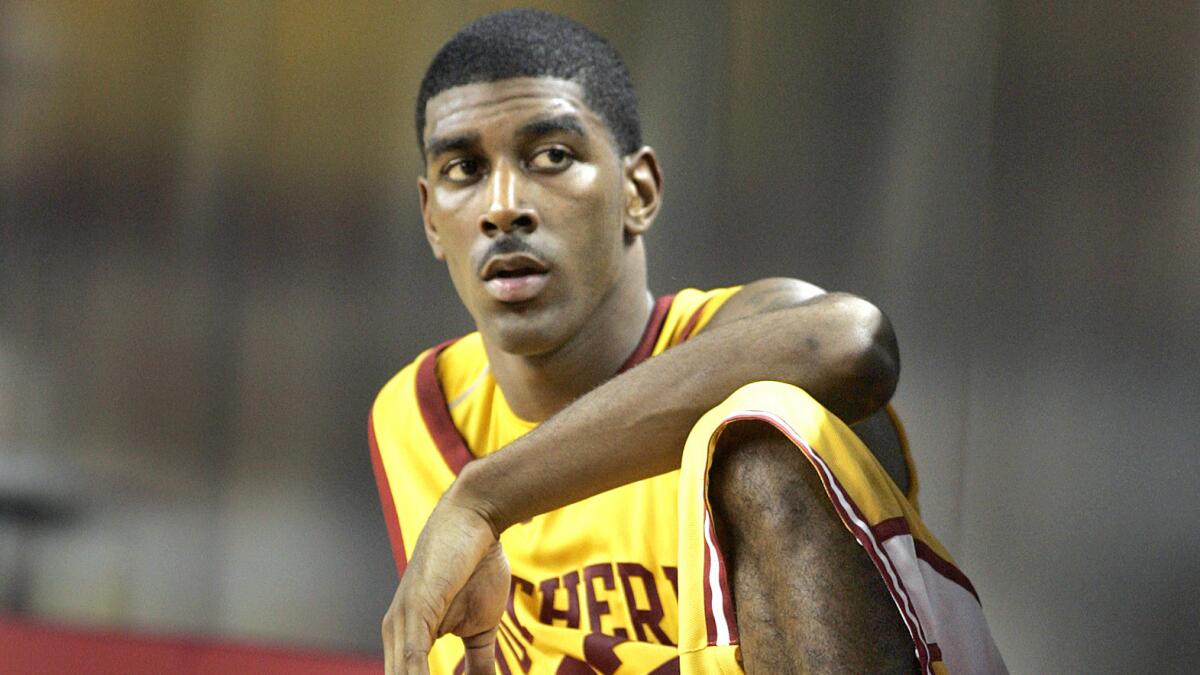USC’s basketball program is rebuilding after dealing with sanctions

- Share via
Relevance was fleeting for the USC basketball program.
The Trojans made NCAA tournament appearances in three consecutive years for the first time in school history and were attracting players capable of making them conference championship contenders.
Then the NCAA shined a light on the recruitment of one of those athletes, guard O.J. Mayo, and the foundation crumbled.
USC has a record of 50-80 in men’s basketball the last four seasons, bottoming out this year with a last-place finish in the Pac-12 Conference.
“The sanctions do their job,” former coach Kevin O’Neill said recently. “That’s what they’re meant to do.”
Last season, their first under Coach Andy Enfield, the Trojans finished 11-21 overall, 2-16 in Pac-12 games, and played before mostly empty seats at their Galen Center home court.
“Clearly, our fans deserve better than that,” Athletic Director Pat Haden said, “and Andy knows that.”
Buoyed by a top-20-in-the-nation recruiting class, Enfield is hopeful that better days are directly ahead. “We had some young players get a lot of minutes last year,” he said. “Our staff and our young players understand what it takes to get to that next level.”
USC self-imposed sanctions against its basketball program in 2010 during the NCAA’s investigation of allegations against Mayo, who played for the Trojans in 2007-08 and recently completed his sixth NBA season.
The NCAA found that from August 2006 through May 2008, Mayo and people close to him took cash, lodging, transportation, a cellphone, a television, watches, shoes and clothing from Rodney Guillory, who was representing a Northern California sports agent.
Trojans coach Tim Floyd resigned in June 2009 because he felt Mike Garrett, then USC’s athletic director, had not supported him after a former Mayo confidant alleged the coach had delivered cash to Guillory.
Floyd, who led USC to an 85-50 record and three NCAA tournament appearances in four seasons, denied any wrongdoing and appeared before the NCAA’s Committee on Infractions during USC’s hearing. He was not penalized by the NCAA, and in March 2010 became coach at Texas El Paso.
Less than two weeks after Floyd’s departure, Garrett hired O’Neill.
The new coach was in the middle of his first season when USC announced self-imposed sanctions that included a ban from the 2009-10 postseason, the loss of one scholarship in each of the next two seasons and recruiting restrictions on coaches. The Trojans also vacated their 21 victories from 2007-08 and returned to the NCAA a little more than $206,000, the money it received from its participation in the NCAA tournament.
In June 2010, the NCAA accepted USC’s self-imposed penalties and ordered the school to “disassociate” from Mayo and Guillory, who were described but not named in the decree.
The sanctions didn’t hurt the program as much as player defections. During the investigation, three returning players — DeMar DeRozan, Taj Gibson and Daniel Hackett — decided to turn pro. USC also lost five players from a stellar recruiting class.
Solomon Hill and Renardo Sidney of Fairfax High recanted oral commitments and signed with Arizona and Mississippi State, respectively. Noel Johnson from Atlanta was released from the USC scholarship he accepted; he enrolled at Clemson.
Forward Derrick Williams of La Mirada High and point guard Lamont Jones of Mouth of Wilson (Va.) Oak Hill Academy also were released from the their letters of intent, and both signed with Arizona.
Williams, Hill and Jones played key roles in helping Arizona win 30 games and advance to the 2011 West Regional final. Williams became the second overall pick in the NBA draft.
“It took away a really good recruiting class, which really left you with two blank classes,” O’Neill said.
USC had a record of 16-14 in O’Neill’s first season, 2009-10, and was 19-15 and made the NCAA tournament the following year. But, ravaged by injuries in 2011-12, the Trojans finished 6-26 and O’Neill was fired 17 games into the next season.
Enfield was hired after leading unheralded Florida Gulf Coast to two victories in the 2013 NCAA tournament. But his first season at USC did not portend a turnaround, and the Trojans got more bad news when it was over.
In April, senior guard Byron Wesley, USC’s leading scorer, announced that he would graduate and transfer to play his final season elsewhere. Wesley said in May he planned to enroll at Gonzaga.
USC will welcome a recruiting class that includes forward Elijah Stewart, the Los Angeles City Section player of the year from Westchester High, point guard Jordan McLaughlin, center Jabari Craig, forward Malik Price-Martin and wing Malik Marquetti.
“We’re going to be probably playing a lot of young guys next year,” Haden said. “But we’ll be more talented and I think in a couple years we’ll be a pretty good basketball program.”
More to Read
Go beyond the scoreboard
Get the latest on L.A.'s teams in the daily Sports Report newsletter.
You may occasionally receive promotional content from the Los Angeles Times.







